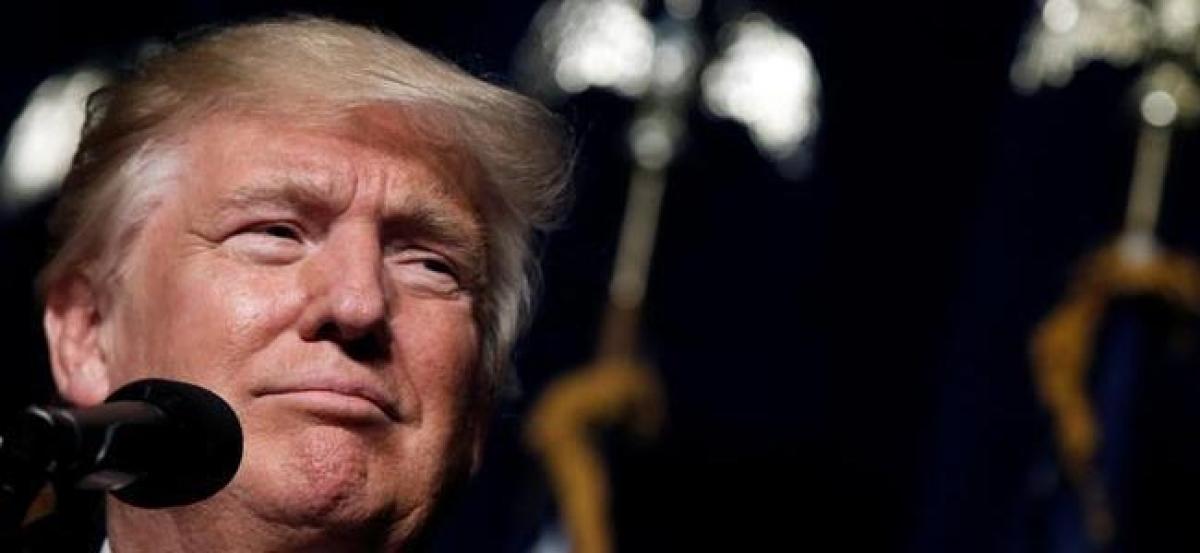Live
- ‘Get Set, Grow Summit 2024’ Focuses on Digital Detox for Families
- Stokes motivates his team to put in extra effort, says England pacer Potts
- From overcoming setbacks to leading India in U19 Women’s Asia Cup, Niki Prasad's amazing journey
- Driving Enterprise Security: Inside Venkata Reddy Thummala’s Leadership Journey
- Constitution debate: PM Modi hails 'Nari Shakti'; makes strong pitch for 'United Bharat’
- Abhijeet Bhardwaj: Revolutionizing Enterprise Analytics with Innovation and Expertise
- Bihar: Inquiry initiated against principal who went to buy veggies during school hours
- Press Sri Lankan Prez for release of Indian fishermen: TN Cong MP to EAM Jaishankar
- TN: DMK postpones executive meet due to heavy rains & Parliament session
- Porous silicon oxide electrodes can fix durability issues in batteries: Researchers
Just In

Republican presidential nominee Donald Trump, pledging a major new military buildup, and Democratic rival Hillary Clinton get a chance on Wednesday to show how they would lead the U.S. armed forces as commander-in-chief.
Republican presidential nominee Donald Trump, pledging a major new military buildup, and Democratic rival Hillary Clinton get a chance on Wednesday to show how they would lead the U.S. armed forces as commander-in-chief.
The two Nov. 8 election opponents are to make back-to-back appearances at an NBC "commander-in-chief" forum in New York, Clinton first, followed by Trump. It will offer a prelude of what to expect from them when national security issues come up in their three presidential debates.
Trump is to lay out a major military rebuilding proposal at an 11 a.m. EDT (1500 GMT) address in Philadelphia. A senior aide said he would outline a plan for new ships, planes, submarines, combat troops and missile defense systems.
It would be paid for by lifting congressionally mandated spending caps and launching a new round of budget reforms to save money. The Trump campaign did not immediately provide an estimate of how much the buildup might cost.
The forum in New York will allow both campaigns to shift their messages to national security, a major topic for voters given the threat of Islamist militants, China's military activities in the South China Sea, and nuclear-armed North Korea's ballistic missile tests.
Clinton is trying to raise questions about Trump's temperament and fitness for office given his history of incendiary rhetoric, such as declaring President Barack Obama "the founder of ISIS," an acronym for the Islamic State militant group.
On Tuesday in Tampa, Florida, Clinton seized on Trump's statement the previous day that if he had been treated like Obama had been on arrival in China last week, he would have ordered the plane to return him home.
Obama was made to disembark from Air Force One on a secondary set of stairs and reporters who traveled with him were hectored by Chinese officials for trying to watch him get off the aircraft.
“Apparently Trump said if there had been the kerfuffle about the stairs and the press, he would have just stayed on the plane and gone home. I think that’s yet another very strong piece of evidence as to why he should never be anywhere near the White House," Clinton said.
NO ADVANTAGE
Neither candidate had an advantage when it came to national security, according to Reuters/Ipsos polling in August.
Respondents were evenly split between Clinton and Trump when asked “which presidential candidate do you believe will be better at keeping us safe?”. Some 38 percent of likely voters picked Clinton, while 39 percent picked Trump.
David Yepsen, director of the Paul Simon Public Policy Institute at Southern Illinois University, said Clinton and Trump both face tests in convincing voters that they are up to the task.
"As the first woman to be a major party nominee, Clinton is forging new ground. A lot of voters will be asking themselves: Is she tough enough? And Trump's excited a lot of people and he scares a lot of others who'll be asking 'is this the guy I want protecting me and my family? Can he handle having his finger on the big red button?'," Yepsen said.
Trump is to use his Philadelphia speech to accuse Clinton of backing "military adventurism" for her handling of conflicts in Libya and the Middle East while she was Obama's secretary of state from 2009-13.
Trump's engagement with the Middle East, by contrast, would be to work with governments even if they were not necessarily strong on democracy, his senior aide said.
Trump has some convincing to do on foreign policy. Many national security experts from past Republican administrations have declared him unfit for the Oval Office.
Presidential scholar Thomas Alan Schwartz of Vanderbilt University said Trump was likely to cite then-U.S. senator Clinton's vote in favor of the much-criticized 2003 Iraq war as evidence of why he is more suited for commander-in-chief.
"I think one thing you'll see at the debates is him suggesting that he'll be a careful commander-in-chief and that it's Hillary more likely to get us into war," he said.

© 2024 Hyderabad Media House Limited/The Hans India. All rights reserved. Powered by hocalwire.com







